#quite a large majority of the questions I get about my guys revolve around shipping or true-love-love or steamy sex
Explore tagged Tumblr posts
Text

I alluded to this fact in a previous question about Theo's preferences for companions: it really depends.
Read more because this got long... tl;dr: IT WOULD REQUIRE A LOT OF SQUEEZIN' AND THE JUICE WOULDN'T BE WORTH IT TO ANYONE IN-UNIVERSE WHO WOULD HAVE TO DEAL WITH HIM EVERY DAY.
Someone could exist who could, in theory, get along with him perfectly and be his ideal man/woman (which again, he doesn't even really know what that would be, so he wouldn't know it when he saw it), and they could start off on the wrong foot with him, set off a tantrum spiral and never recover his esteem for the rest of his life.
Even if someone who could be compatible with him was able to pick their way through the bear traps of his mind and get close to him, that doesn't necessarily mean anything would come of it. He can get infatuated easily, experience flickers of attraction - but he would much rather ignore those feelings than act on them in any way beyond just trying to be a good and loyal friend and benefactor.
And then, even if someone got close to him, and he was infatuated with them AND recognized those emotions for what they are (a big ask in and of itself), he STILL would not want to enter a romance because that would change the nature of the relationship, he doesn't know what to do in a relationship, and he wouldn't want to entrap someone in a relationship with him (Gods, the horror) or suffer the travails and indignities of romance because all his experiences tell him that eros is a corrupting force and always ends really, really badly.
So one could ask him to start a relationship, and the absolute best result would probably be a polite and firm decline with some blathering about the nobility of "unrequited courtly devotion," with the more typical result being a meltdown.
Effectively, one would have to stay close to him for actual years in close proximity without leaving for greener pastures than him (which one should) and maybe, maaaaaybe if the right mental dominos fall he could conceivably think of entering a relationship. Except in Amaranthine, he'd only want to do that with a childbearing woman because he feels he needs to have children to continue his withered, hollow excuse of a family tree. AND THAT WOULD START A WHOLE OTHER SAGA. ALL THAT ABOVE WAS JUST GETTING TO FIRST BASE, LET'S NOT EVEN GET INTO WHAT IT'D TAKE TO GET ALL THE WAY TO FOURTH. Anyone not able to produce more Norths would have a whole 'nother endurance test to slog through to work through his issues about debt to his family and legacy and all that nonsense. And would either path be worth it to someone? Performing years worth of informal therapy (not real therapy, he hates doctors!) on a messed-up guy just to get him to maybe agree to go out with you? Probably not!
To bring it back to the beginning, despite all I've written here, it all depends. I don't think I can write a rulebook or point-by-point guide for "how to get Theo to agree to date another imaginary person" because in the end, he is a fictional character and he is more beholden to what would be interesting for my partner and I to write and draw versus anything else. And it would depend on the setting, the characters involved, the circumstances that befall them, myriad little factors that could influence what feels natural for him to do. Maybe there could be an interesting story we come up with where he falls irrationally head-over-heels for someone and proposes the same day. He could also spurn all companionship and focus his attention on other pursuits.
So... if anyone is expecting any sweet blossoming love stories to come to fruition within Theo’s story in Amaranthine… the odds aren't good. I don’t have much interest in writing “romance” as a genre, only incredibly dysfunctional relationships as a vehicle to cause strife and comedy in fucked-up weirdos' lives.
#asks#I mean technically a post submission but still#text#hmm... i've got to think of a better tag for these long dumps haha#sometimes I admittedly feel a bit embarrassed and guilty because#quite a large majority of the questions I get about my guys revolve around shipping or true-love-love or steamy sex#and that's just not what i like to play with my toys#those things can be a fun treat but like candy corn#i get sick of it easily and i need some MEAT (evil guys being dysfunctional and getting kicked while they're down)#...i never said i had good taste just different taste#but yes sorry i cannot feed people that kind of treat most of the time i'm busy making like... disgusting fermented fish heads instead
29 notes
·
View notes
Text
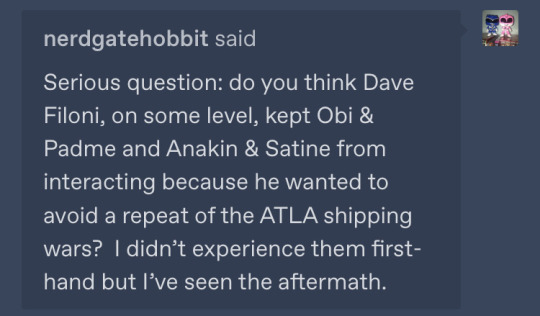
@nerdgatehobbit Hey! Thanks for the question! Ik you asked this to my main but imma respond on my SW blog if that’s okay?
So whew that’s a big question. Do I honestly think that Dave kept Obi Wan and Padmé and then Anakin and Satine from interacting in the TCW show because they didn’t want shipping wars?
(Remember, these are all just my personal opinions. I do me and you do you!)
Short version? Yes and no. Long version? Under the cut because I can never shut up.
Firstly, I don’t wanna say this was all Dave’s decision. He was one of the top guys in charge of TCW, yes, but he was far from the only one, there was an entire creative team working on the project, and during the time of TCW’s original six seasons Lucasfilms was not owned by Disney yet and George Lucas himself had a very large amount of creative control over the entire show. So I don’t really think it’s fair at all to point fingers at any choices the show made and go “yep that’s completely 100% Dave’s fault alone”.
I also don’t quite think they were concerned about shipping wars in the way ATLA had them. Avatar’s shipping wars were so absolutely toxically rancid that they legit drove me right out of that fandom. I’m still hesitant to come back during the current renaissance because of them. Star Wars, prior to the Sequel Trilogy, never had shipping wars close to that calibre of pure nastiness. The fandom was a godawful cesspool that fought to the death on most aspects of the franchise, this has always been true, but shipping, if I’ve read right, was somehow never really one of those hot button issues within fandom. I don’t think Lucasfilms kept the Clone Wars four apart because they were afraid of fans fighting over ships.
That being said, Lucasfilms HAS always been Very Strict on how they want their characters to be seen, romantic-wise, way back to when they would terrorize Original Trilogy slash shippers back in the 80’s and 90’s with threats of legal action. It’s part of why they were Very Firm in their insistence that they had absolutely nothing to do with all the Luke/Mara Jade EU stuff. You either abided by LF’s canonical romances or not at all in their world. So yes, in the case of Obi Wan and Padmé, I absolutely think the writing team’s decision to keep the pair of them apart was almost entirely so fans didn’t ship them together.
Why do I think this? Because there is no other rational reason why Obi Wan and Padmé haven’t had a single second of screentime in TCW that hasn’t had either Anakin or Satine also in the room as a buffer. Not when Revenge of the Sith EXPLICITLY portrays their relationship as relatively close friends who care about each other. So nope, I genuinely think the show just doesn’t want the fans to consider any other relationship for Padmé besides Anakin.
But why would they do this just to her and Obes? Obi Wan and Padmé both have other friends of different genders, why don’t they worry about us shipping THEM? Well for Obi Wan’s case, it can be excused that he flirts with everyone, so we’re conditioned to think that it’s never anything serious, and none of the other characters are married to the main character of the series. This is entirely because of Padmé’s position. Yes, she has other male friends, but either they’re nonhuman and not conventionally attractive so the series doesn’t see them as a threat, they’re Clovis, who they actively show Anakin going into a jealous fit over, or they’re Bail, who can be excused by the fact that he’s already married and also because he’s never actively shown as in competition with Anakin for anything, so he’s not threatening either.
Obi Wan, on the other hand, is a major threat to Anidala in the show’s eyes. They already constantly make a point to compare him and Anakin in almost every opportunity. Which is strange, the show’s decision to force them into the role of narrative foils to each other when in the movies that isn’t the case at all— Obi Wan is much more of a foil to Sidious and Anakin’s foil is Luke —but yeah, the show very often has Obes and Ani going through similar situations with competing viewpoints— ESPECIALLY their canon romances, and I won’t rant about how the show’s attempted Anidala and Obitine parallels fall apart under scrutiny right now but if yinz want the rant sometime let me know.
Obi Wan also has the canonical ability to charm the pants off of literally everyone he meets. Nearly everyone in canon is in love with him, 80% of the fandom at least is in love with him, and I KNOW most of the crew was in love with him too. Anakin, on the other hand, has a very abrasive personality and is much easier to dislike. The show was ALREADY terrified of the fans not liking or wanting to root for Anakin to the point that they reworked his entire personality to make him more palatable to his critics from the movies. Plus, Obidala fans already existed! Since the first and second PT movies, a big group of people already shipped these two because they already thought Obi Wan was a preferable match to Padmé than Anakin. The studio did not want to encourage this.
So yes, I think it was a combination of the show’s tendency to already try and get the fans to compare Obi Wan to Anakin for everything else plus their insecurity in Anakin’s image and likeability as it was, that they did Not want the handsome charming not-future-evil guy around the leading lady and threatening her canon romance by existing as a possibly better option. So Obi Wan and Padmé got no stories together, just kinda throwing the opening ROTS left them in the garbage ¯\_(ツ)_/¯ The worst part is, there is so many potential places in TCW where Obi Wan and Padmé could talk to each other, like during her investigation into her friend’s murder, during the Clovis arc, bits during the Malevolence arc, the earlier Naboo crisis arcs, even the one time where she’s just hosting a damn party and wants to invite her friends gahhhhhhhh
Anakin and Satine, I also think yes, but this is also a case of half and half because Satine isn’t nearly as major a character as the other three are, and out of the nine episodes she appears in, she only has more than a singular line in seven of them, and out of those seven, only two of them aren’t revolves entirely around building her relationship with Obi Wan. So really, there is a defence for the writers here in noting that there’s not as much room to explore Satine’s character as it is, let alone trying to shoehorn in a scene with Anakin.
Except no, I’m not gonna give them that defence because in the two episodes where she only has a speaking line or less— Obi Wan’s funeral and the Ahsoka and Lux meet Death Watch ep —I can already easily think of ways she and Anakin could have really meaningful interactions in them both. Y’all have already heard my bit on how they could have a real important conversation at the funeral, but y’all HAVEN’T seen my idea for a rewrite of the Carlac ep where it’s a two-parter, Anakin comes with Ahsoka and Padmé to the negotiations on Mandalore, and it ends up with a subplot of Anidala chasing after Ahsoka and Lux with Satine as the put-upon third wheel and we get foreshadowing to Satine being Bo Katan’s sister, so when the reveal happens the next season it actually means something.
So yeah, it was partially because of timing constraints, but it was also DEFINITELY in part because they didn’t want Satine being shipped with Anakin— which ppffffft, if they were brave enough to actually try writing these two in a conversation in-character, they’d understand how much of a not-worry this would be xD —because the show is set on the fact that despite maybe there being other flings at some point, Obi Wan and Satine are each other’s one true tragic love (Or, at least Obi Wan is Satine’s. He’s always had more freedom and decision than she has in this narrative, and that’s always kinda bugged me). So, that means Satine can’t interact with any men unless they’re gonna betray her trust and try to kill her by the end of the episode, because the show needs Obi Wan to have a loyal, steady, good girlfriend because he is a good man.
(And yes, before anyone says it, I have heard the more unpleasant rumors behind why exactly Obi Wan was given a girlfriend in the show, but as I’ve yet to see any official proof of them besides fandom salt, I’m not gonna spread them because those are hefty accusations to throw around).
So yeah, Satine can’t talk to Anakin partially because time constraints, but also because she isn’t allowed to talk to any other nice men besides Obi Wan and her son (no I don’t particularly like the Korkie Kenobi thing, but it is blatantly obvious that that is what the show was implying and I’m not gonna pretend otherwise), and Obi Wan and Padmé can’t talk to each other entirely because the show saw Obidala as a threat to Anidala.
Again, just my opinions and things I noticed, y’all are more than free to disagree and discuss with me.
#can i EVER answer someone’s question without going on an entire ranting spiel? stay tuned to find out lol#ask#asks#nerdgatehobbit#sw the clone wars#morai musings#our only ho#queen of my heart#peace out#one (1) hot mess
24 notes
·
View notes
Text
Detroit: Become Human (2018) -Exploitative Sci-Fi for Gamers
The Following article contains major spoilers for Detroit: Become Human
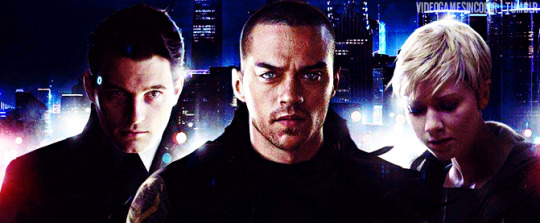
Folk can’t quite believe DBH’s player base loves Markus by an 80% plus margin. It’s like Grey’s Anatomy doesn’t exist or something.
On some level, Quantic Dream’s video games following Beyond: Two Souls are going to be a mechanical refinement of their gameplay, and not much else. If the Ellen Page driven game demonstrated anything, it was that the studio’s creative head has an innate inability to learn from his mistakes and he’s got a fetish for particular narrative cues, and all of them revolve around violence, racism and shock value.
Detroit: Become Human shares a lot in common with Max Landis and David Ayer’s 2017 direct-to-Netflix film Bright. Both are allegorical tales that utilize the iconism, present and historical, of the Black community and their key movements as a backdrop for the oppressed fantasy caricatures of their tale. With Bright, Orcs were the Allegorical Black community of the here and now.
With Become Human, Androids are representative of the Black community at various points in our people’s history. All of it is supported by the locale of Detroit, Michigan, a state with connections to the Underground Railroad (the game hits you with this trivia bit right off), Martin Luther King Jr., and anti-black violence that embroiled much of the United States when my parents were children.
Bright attempted (and failed) to re imagine some weird not-so-post-racial world where Tolkien-inspired aesthetics and archetypes were our history and influenced our present, with little changed about our factual history. Mankind is united in mutual hate of Orcs, and the motto “Black Lives Matter” continues to be a punchline to those unaffected by police brutality in a world where fairies are the equivalent of pests.
Become Human is yet another in the long line of over bright and sterile science fiction games that want to be Blade Runner, but doesn’t have the wherewithal to pull it off. And this is mostly because it’s too busy trying to shout “message!” For lack of a better word, Become Human gags itself with its own allusions despite some particularly interesting mechanics and sequences that exist within the ham-fisted racism narrative.
What is Become Human about?

The primary narrative of Detroit: Become Human is driven by the story of “Markus” (Jesse Williams), a specialized android, that, like most, runs the risk of triggering a dormant "virus” that simulates sentience in androids. He was gifted to old artist by the android creator (a man named Kamski). The beginning of his narrative sees him care for Carl (Lance Hendrickson), the old man in question.
He gets kicked around by anti-robot protesters, and has to ride the back of the bus with other androids. After telegraphed prompts that tell you his mistreatment at the hands of Carl’s son, Leo, is not far, the virus triggers itself, Markus begins to act of his own accord. The end result, where he may or may or not kill Leo, or simply gets blamed for the death of Carl when he dies of a heart attack, leads to his being shot by the police.
After he’s practically destroyed, he reactivates and he pulls himself out of the mud Shawshank Redemption-style and finds an abandoned ship full of busted androids that were looking for a leader. Markus, not interested in hiding the shadows, more or less appoints himself in that position because he’s the only one with some kind of proactive goal: To end enslavement of androids everywhere.
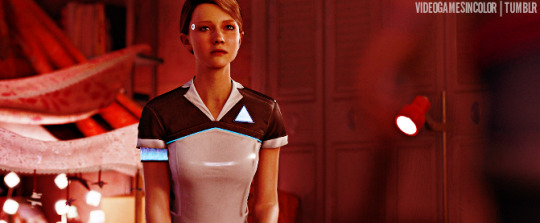
The secondary narrative focuses on a service android named “Kara” (Valorie Curry), who was busted up by her owner - a man named Todd Williams (IIRC) - during an abusive fit against his daughter, Alice. After she’s repaired, Kara returns to his home and resumes caring for him and Alice and accidentally discovers that Alice is not a human child, but an android (apparently Todd’s wife left him for an accountant and took her daughter with her). She ignores it, and, under duress, gains sentence when she believes Todd is going to kill Alice while high on Red Ice (a hyped up version of Crack).
She runs away with Alice in the hopes of reaching the Underground Android Railroad to escape to Canada where there are no robot laws, and encounters a fairly large (Black) Android named Luther, who decides he’ll do anything to protect them from harm.

The third narrative is that of “Connor” (Bryan Dechart), an android type, designed specifically for police investigations. Connor is sent to work with a grouchy old detective named Hank Anderson (Clancy Brown), who hates androids (because reasons) and doesn’t want to be bothered Connor’s overly stiff behavior and awkward attempts to get to know him.
Connor and Hank effectively run behind the likes of Markus and Kara, their narratives intersecting every now and again (until the end of the game), trying to figure out why Androids keep going homicidal and killing human beings.
While Markus’ plot drives the surface narrative, not unlike Bioshock Infinite, behind the scenes, the plot of Become Human involves a faceless corporation named CyberLife. From how I understood it, CyberLife, with the sole living monopoly on android creation, is looking to create an artificial conflict between humans and androids by using a virus that simulates sentience in machines that causes them to rebel against their owners.
When enough chaos is created, CyberLife would keep up the facade of an issue and supplant their man-made rebellion against humans using android (Connor) with no real “free will” of its own. It’s about as sci-fi as you can get and probably should’ve been the focus of the narrative from the jump.
Characters in Become Human;

I can’t wait to see white-face Android cosplay at this year’s conventions :D
Out the three playable characters that the player can control, the androids Kara and Connor have narratives that are focused more on the “personal” than the Frankenstein politics of the game that Markus represents. Performance wise, of the three characters, Valorie Curry and Jesse Williams give an ideal “robotic” performance that feels natural to their characters respective roles.
Of the characters within Markus’ narrative, Josh and Simon are probably easiest to become endeared to. They have opposing opinions on how to handle their rebellion, but they’re not rivals. They have the strongest rapport with Markus, but the game barely gives either any screentime so they’re effectively minor characters that get wasted for some arbitrary “Josh and Simon will remember that” nonsense.
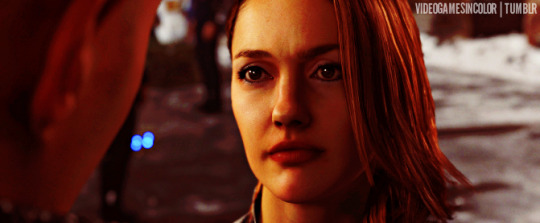
She’s like that guy from Two Souls who wouldn’t take “no” for an answer
Carl is an obnoxious “nice old man” type that’s supposed to represent the best of humanity, but given the context of the world, he’s willfully ignorant to the climate that game itself ignores, and his interactions with Markus are uncomfortable to watch. The narrative pushes the android North (Minka Kelly) at the forefront of the Markus’ narrative (at the expense of his relationships with Josh and Simon), and she is the least interesting character out of the bunch that gets face time with Markus. She simply exists to say “Hey, Markus, choose violence” and instantly be promoted to lover. Simon and Joshua are right there, my mans.
Markus himself is a frustrating character for me, because (aside from my scruples with his actor) he is so representative of a white writer’s ideal Black character. It’s hard to even root for the character beyond the general principal. His arc stokes a kind of anger in me like nothing else. And the other part of me simply cannot wrap her head around Jesse Williams (a former public school teacher, with more than a little knowledge on racism) just signing off on this nonsense that effectively makes the character what he is. But, this wouldn’t be the first time a Black actor made questionable career choices.
With Kara, what keeps her narrative engaging are her interactions with Luther, Alice, and her denial that Alice isn’t a machine, but a human girl. But, Kara’s disadvantage is that she is a female character created by David Cage, so he spells out to the audience what he thinks she is: A motherbot to a childbot, that’s her entire role.

Why can’t we be friends?
Her desire, her want to save Alice from Todd isn’t Kara being concerned about someone who’d be under her care, someone who has to rely on her for help given her age. Instead it’s treated like the path to motherhood as opposed to a friendship. It’s like watching a version of Ripley and Newt’s relationship in Aliens where the reason for Ripley and Newt eventually regarding themselves as mother and daughter (their shared loss) doesn’t exist. Even the guy who assaults Kara and (potentially) wipes her memory assigns motherhood to her concern for Alice and it’s like, “well, that’s a bit fucking presumptuous of you, mate”.It’s really gross.
And in that sense, Alice isn’t a character; she’s a narrative tool to further exemplify Cage’s odd fixation this particular aspect of femininity. The performance of the actors sells the relationship quite well, about as well as Ellen Page sells the suicidal agony of her character Jodie Holmes in Two Souls, but the sudden promotion to “mother and child” is unearned and artificial.
The attention to detail that goes into Connor’s narrative, the choice of whether or not the player will allow the virus to trigger sentience, or go full on Robocop and fulfill the desire of CyberLife to the letter, is not the kind of detail you see in Kara and Markus’ tale. His narrative is primarily driven by the pseudo-paternal relationship he ends up forming with Clancy Brown’s Hank Anderson, who mourns the death of his son (insert “Jason!” joke here), but for reasons completely unrelated to his hatred of androids (he admits that much in the climax).
Every time the game puts Hank in danger, you’re given the choice of perusing the mission or risking a 40-80% chance of survival doesn’t mean the game will fuck you over and kill the Kurgan. I’m gonna assume everyone dove over their coffee tables to save Mr. Krabs and hung the mission.
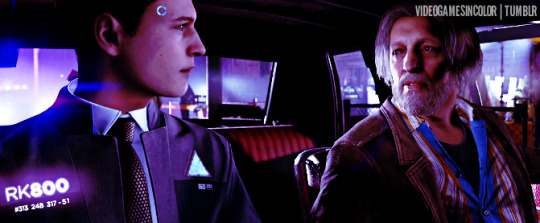
Clancy has really round eyes, and I’m just noticing that for the 1st time
The he arc is as engaging as it is because of Clancy Brown’s performance. Dechart tries, he’s got a great rapport with Brown (unquestionably), but his limits are obvious. He often sounds like he’s putting on an act, something you shouldn’t be thinking of during an actor’s performance, and that can be distracting (I’m sure the direction doesn’t help either). I wouldn’t be surprised if that some point Quantic Dream was debating over whether or not this would be a game focused solely on Kara or Connor. Markus feels like something that was jammed into the game at the last minute to satisfy Cage’s celebrity itch and ideas of being progressive. That’s something I’ve always thought since they debuted the character back in E3 2017 (IIRC).
Out of all the human characters in the game, Clancy Brown’s Hank Anderson is the only one that feels like a person and not a plot device. Sure, he’s wrapped in all the trappings of a generic loner cop who hates partners (insert Buddy Cop Reference Here), but Clancy Brown manages to make an otherwise dull character work. On the flip-side, the generic asshole cop is such a walking stereotype there’s nothing genuine about his interactions with anyone.
He’s just there to reinforce the fantasy prejudices of the game and harp on and on about “them robots are gonna take our jobs”. Like, he didn’t need to exist because he does not contribute to the plot. The all too comical way he says “Fuck” (like he’s sneezing or some shit) – in a poor attempt to emulate the frustrations we often see in procedural dramas or action films when a standoff occurs – only further highlights how much of a caricature he is. This nigga can’t “bad cop” to save his life.
There aren’t a lot of characters to write home about in Become Human, or if there is I keep forgetting all about them and I can’t be arsed to recall them. Most of them are inconsequential and disappear after a single level appearance. If I’m being honest, I don’t hate the characters in Become Human (not most of them), so much as I loathe what some represent.
The Mechanics of Become Human;

Next Level Detective Vision(TM)
Become Human’s strength lies in being what I think is a fairly solid attempt at broadening the multiple choice system Adventure Games are otherwise derided for by individuals with a limited idea on what constitutes as a video game. It’s clear that Quantic Dream has taken cues from the likes of Dontnod Entertainment and Supermassive Games’ Life Is Strange and Until Dawn. Both are studios (with writers) managed to create a pair of fairly compelling adventure games, with wildly different takes on the multiple-choice system that’ll probably be remembered better in the positive than most, Quantic Dream included.
There are a number of outcomes that can happen within the game, depending on your actions. Some things change completely, other times it feels like a lot of its surface detail meant to wow you the first time. There’s usually only one conclusion to a level. For instance, even if Connor investigates the ruined house that Alice and Kara are hiding in, the end state is always going to be Kara and Alice escaping, no question about it. Markus always ends up getting shot and torn apart. Whether or not you decide to attack Leo doesn’t change his end state.
From my understanding there are multiple endings a player can get based on what the game decides are “morally wrong” decisions. Connor killing Androids for example, may always lead him down to a path of deactivation if you choose to fulfill your mission to the letter. Some, if not most of the central player characters and their cast can die. Hell, Markus can apparently just peace out of being the leader of the farcical android rebellion and North will take over in his place (that cracks me up). And one the more extreme options is to nuke Detroit to run the humans out of town. Whether or not it’ll make sense is another matter entirely.
Depending on the length of the levels, there are a number of things you can investigate and locate with the help of detective vision. Most of it really doesn’t inform the world in any meaningful way, a lot of it is collectibles for the sake of collectibles that never carry any consequence into the game (and the one item that does, is hidden and used as a moralizing plot twist that reeks of Cage brownnosing). The rest actually effects what you can say to characters.
The more details you find and learn about, the longer your multiple choice dialog lists becomes for certain characters. The problem, like with most multiple choice prompts, is that single words defining the response often lead to “oh, wait, shit, I didn’t mean that!” Because Cage clearly had different ideas about what “determined” and “uncertain” meant.

Jesse Williams??? In my junkyard???
If you’ve played a Quantic Dream game, then you know the deal mechanically. Motion Controls and Quick Time Events that more or less act like a fast forward button on a cinematic. Things you’d otherwise be able to do with basic button inputs, or a push of the analog stick, without any sort’ve guide, are rigged to Quick Time Events and motion controls. Want Marcus to stand up? Well you gotta wiggle that control and press and hold down numerous buttons before the cinematic decides to allow him to stand up.
It’s basically Telltale mechanics, which isn’t bad per say, but I like being able to stand up without playing Twister. The most freedom you get as a player is being allowed to walk around – to some degree – at your leisure (unless you’re being time attacked) and just take in the environment and click on stuff. In some instances, if you take too long, the game jumps to the next cinematic and that’s that.
Respectively, Connor and Markus are the only two out of the three androids that can create or recreate scenarios of through the study of their environment or certain objects. Markus can deduce whether or not he can make certain jumps or defenses against attacks. Connor can more or less do the same, but his mechanic is structured around picking up objects in crime scene and recreating a simulation of how events may have happened.

Kara lets her Otaku flag fly
Compare all of that to Kara, who can just change the color of her hair from blonde, black, brown and white. Her whole character seems built around her pixie hair cut and to that degree, the banality of her attractiveness (and remembering the creepy as fuck tech demo this game spawned from reinforces that). Yet, Connor and Markus can be both “attractive” and “functional”.
Philip Sheppard, Nima Fakhrara, and John Paesano compose what I think might be the best score from a Quantic Dream game I’ve heard after Beyond: Two Souls (which had Lorne Balfe and Hans Zimmer as its composers). It clearly apes the Vangelis aesthetic in a lot of places (namely Connor’s segments), but each character has a unique theme that either gets integrated into myriad of moods the music can adopt, or plays straight in a lot of sequences. It works pretty well as background noise, separate from the game.

All this scene needed was a saxophone
Another strong element in Become Human, outside of its narrative tree design, is the game’s environmental design. Become Human takes what are apparent cues from Dontnod Entertainment’s Remember Me, which imagined a futuristic Neo-Paris with a far more grounded approach than something like the direct-to-Netflix film Mute or even Blade Runner 2049, which is all lights, holograms, smog, and high-rise buildings. Become Human is chuck-full of nighttime shots, and rainy environments. There are still remnants of the old Detroit, but its slowly being dominated by the future that shouldn’t be able to sustain itself with a 40% unemployment rate, but go off Quantic Dream.
If you’re the type who’s easily wooed by high definition graphics (which isn’t something to write home about anymore. It’s done capped itself), especially with all the hub-bub going around about 4K RESOLUTION AND 4K SCREENS, then Become Human won’t have to do much to impress, just hit you with a lens flare.
With regard to cinematography and choreography, when Become Human is good, it’s good. Two of the strongest sequences in the game are the dead end story thread where Connor and Hank go checking into a bird infested apartment occupied by a runaway android, and the entire attack on the Jericho. Connor’s pursuit sequence is, for the most part, is pretty well directed, and it’s what I look forward play in a game like this. But, its also where the QTEs hindrance comes into play far more often. It’s not the kind of scene that needed anything except the prompts telling which way was safer and which way was quicker.
The Jericho siege is a fast paced implementation of the character perspective switch (that began slowly in earlier parts of the level) that works to keep varying levels of stress pressed upon the player. You’re encouraged to hide as Kara (she ain’t shit in a fight) and the game tries its damnedest to kill Luther (<_<), Markus has to save everyone he can (top priorities: Josh and Simon) and suddenly gains the ability to Keanu Reeves just about everyone in his path; Connor, from I can recollect, is more background support for Markus and gets shot if you try to save North (<_<). It’s cinematic when it counts and interactive where it matters.
Those are the two stand out sequences. The rest of the action in the game is more reflective of the awkward “which Connor is the real Connor?” fight scene which is just clumsily shot and broken to hell with QTEs (to say nothing of how botched the “tell me something only the REAL Connor would know” scene was).
Questionable Worldbuilding

Kamski, David Cage’s self insert.
There’s a certain level of suspension of disbelief required when it comes to science fiction. Unless you’re an author like Michael Crichton (who lived and died by the amount of [academic] research he put into his stories, or borrowed from his own experiences) science fiction – moreso than fantasy –, especially dystopic science fiction, is always gonna be amalgamation of fact and some nonsense an author threw at the wall.
But the mark of a good writer is usually the one who has you thinking about the ideas presented in the narrative, not what you as an audience member would’ve done to fix the narrative’s persisting problems. In this case, Michael Crichton is the former. David Cage is the latter.
The world in Become Human doesn’t feel lived in. There’s no real explanation as to how the world in the game got to where it is, and its obsession with “World War 3″ is a lazy dab into politics. There are places and circumstances that fit each situation in the narrative, but on a whole, it doesn’t feel like a place that could actually exist like Middle Earth, or even the Earth of Harry Potter, which blends the “wizarding world” and the “muggle world” together quite well without creating a grievous dissonance in the narrative. It’s a collection of sets characters are strolling through.
Cage lifts strife and topical issues from the past and present to build his world, but utterly fails to understand the context and environmental circumstances that informs what are issues steeped in anti-blackness and white supremacy. He’s not unlike Zack Snyder, who is so preoccupied with how “cool” a scene in his movie looks, there’s never anything of substance in the final product. The depth of his understanding of racism, mass deportation, and antisemitism is that it’s “bad” and not much else.
For instance, there’s little explanation as to why Canada has no Robot Laws (not one I found), or why ‘sentient’ Androids would even assume why they’d be safe there and not sent right back to the United States. Another head scratcher is a law only recently required androids wear signifies that they were machines, when uncanny valley still seems to be a hugely noticeable problem (at least when the plot requires it).
There’s the usual Cage mumbo-jumbo of a messiah figure come to rescue his characters from strife (RA-9, the androids call ‘em), but given that the game constantly implies that “Deviancy” was not a widespread or common thing until recently, the attempt at creating a “folk hero” character for the Androids make little sense given the story fails to properly set up its protagonists conflict. Its ever only brought up in a explanation manner and dropped shortly thereafter. it’s untrimmed fat for the investigative bits of Connor’s gameplay passed off in a move to make the world seem more lived in than it is.

You can’t afford a job, you can definitely afford to oppress a android
The big talking point that many believe punches holes in the narrative is how the implementation of Androids have impacted humans socially and financially. Become Human presents itself as a pseudo-futuristic world (set in Detroit, Michigan) of 2038 (twenty years from now) where Androids cost the equivalent of what some folk I know think an Apple or Google Android cellphone might twenty years from now (it’s like $8k or something?). Even if you’re hard up for cash or living hand-to-mouth with a drug habit, you can afford an android somehow.
Androids are allowed to participate in sports despite the general danger to human life that poses, but no one really comments on that (you only know about it because of a collectible) in the game. Not a single person of color took issue with the fact that a rich white man created androids that looked like people in their community, and effectively built them for nothing except labor, sex bot fun times, and absolute servitude.
Androids have also become so prevalent as the labor or work force, that 40% or more of the American population (I guess??? It’s unclear) is out of work. And In which case, old man Carl, sitting financially secure up in his mansion with an android, is the personification of a rich man out of touch, but having the gall to look down on the protesting poor (which is not how the narrative frames in the least).
Reasonably, this should mean the economy is in a bad way on some level. Yet, the states is somehow stable enough to maintain pristine streets, glossy stores and a thriving economy, despite most people being too broke, poor, or out of work to actually support it.
Capitalism has gouged a hole so badly into United States, it shouldn’t be able support itself the way the game presents, and this is based on just how utterly messed up the general landscape of unemployment in the Great Depression was at a mere 25% (15 million unemployed) as most people keep bringing up. And that was following a market crash that’s often used as barometer against the 2008 market crash. Our current unemployment rate is apparently 3.8% and the US has more problems than it can manage.
You’d think the world would actually look like something out of Days of Future Past or Judge Dredd, or maybe even mimic what was documented during the actual Depression (a little less extreme than the above). But, no, not really. Folk aren’t rioting in the streets, being suppressed by the police, aren’t demanding something be done a corporation that put them in a bind, or trying to overthrow the government for fucking them over the financial hole with machines. (Or at the very least leading the rich to the guillotines.)
No, most (even people who aren’t financially well off) still live relatively comfortable lives, maybe a few of them are homeless because of the android situation, but for the most part nothing seems to have really changed. And thinking about that just rather leads you down a rabbit hole of, “okay, well, how different is the economy from our reality that this can happen and the world is functioning as it were the 21st Century present?”
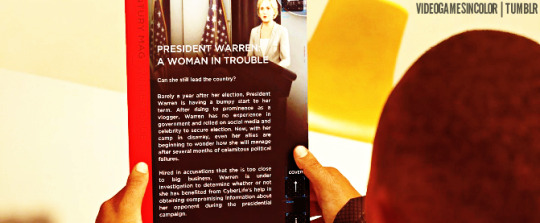
The future ain’t no promised land...
The game also wants to make a big to do about there being a white female president (more brownnosing from Cage), but the most you ever learn about this character is in a collectible and she simply exists to appear at the end of the game’s “good” or “bad” endings then disappears. And for the most part, considering he’s not exactly preoccupied with how politics plays into capitalism, what is so progressive about a white female president who isn’t all that bothered by the fact androids have put most of the people who probably voted for her out of work, and doesn’t lift a finger until androids start going homicidal? She not getting reelected.
The “humans are racist against androids” spiel falls further apart you realize that Cage wants to draw a parallel to a couple people with signs and the homeless, to the literal white supremacists of [middle] America that voted Donald Trump into office on the promise that he would deport and exile immigrants that “took American jobs” from the hard working racists of the United States. He wants people to believe that, when he’s created a circumstance where people would be rightfully pissed that they’ve been replaced by machines (who aren’t immigrants, let alone prisoners in Nazi Germany) and have no financial means. But, emotions, y’all, machines are people too.
Mankind in Become Human is united by their mutual racism against robots. So much so, that the habit of referring to machines with gendered pronouns or pet names is a thing of the past. Male or female coded androids are just “it”, not “they”, “she” or “he”. Racism is apparently a thing of the past. Sure, Rose (Harriet Tubman reborn) makes a reference to historical racism, and Markus bleats, “human have been killing each other over skin color and god for eons” (as though this is supposed to distance the android narrative from the allegory Cage wrapped his game around), but for all intents and purposes, you never see this this exemplified in the game that isn’t an [un]conscious display of Cage’s racism.
Like most allegorical worlds, Cage’s world is so preoccupied with creating this victim paradigm with robots, that it appears post racial to the point where the only problem that exists is basically “goddamn, I really hate those robots taking our jobs”.
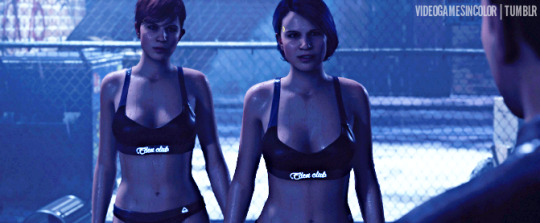
For Tracy, Blue Hair Tracy is the Warmest Android
Hell, Homophobia’s not even a problem, because two female robots with the same face can basically declare their love and the only thing unusual about it is “Robots in love? I can’t comprehend that!” So, the one thing that needs to be Kumbya’ed into the past is anti-android sentiment and thanks to the multiple choice system in the game, you can either eradicate android resistance, or create a world they might sorta kinda be free (or at least the lead characters can).
For all the bluster about humans not seeing robots as individuals, they protest against and treat the androids like they’re individuals, as opposed to protesting against them as symptom created by a company that exacerbates their problem.
Appropriating Specific Pains For Entertainment

A Black Cop faces Androids mimicking Hands up, Don’t Shoot
The internet was a big part of why so many Black voices have been heard in the wake of what has always been a commonplace thing – the violent and needless deaths of people within the Black community, man, woman, child and infant. The period between reports on the exoneration of the police officer who murdered six year old Aiyana Stanley-Jones in 2010, and the murder of Trayvon Martin in 2012 seems long enough that, if you simply weren’t paying attention, you’d never consider it an epidemic like we do now.
But the deaths of Michael Brown, Eric Garner, Tamir Rice in 2014 and Sandra Bland and Freddie Gray in 2015 all seemed to bring an end to that. The less than graceful handling of the issues by the white media made it impossible to ignore how the damaging effects of the frequency of Black death were, created Post Traumatic Stress in the Black Community.
David Cage, in perhaps one the more naked displays of ignorance, decides it’s a good idea to use the imagery of the Black Power fist to represent oppressed machines wearing human faces. He decides the plight of the androids, who protest in the same fashion Black Americans did in Ferguson, Missouri, New York City, and Baltimore City, their hands up and marching through the streets, is a comparable to demanding the end of state sanctioned police brutality. He decides, the comparison of machines who suddenly gain sentience for little to no reason other than their creators manufacturing a fake rebellion for shits and giggles, to Black lives demanding that people stop killing them, are comparable situations.

She can’t quite believe the tagline she comes with
Throwing them in the back of the bus, slapping them with iconism that draws allusion to the Jewish Holocaust (which gets worse with a bad ending and references of Androids herded into camps for destruction), parking them in place like bikes, and putting them on display in stores (like slaves being auctioned off) is sensationalism mean to pull at the heartstrings – and it’ll definitely get you feeling some kind of way, that’s for sure.
I think the one thing that truly made me ill was reading subtitled off-screen dialog near the end of the game say, “Androids were being hanged all along Woodward Avenue.” It repeated in my head like an ugly mantra and I kept having to pause so as not to throw fit. The levels of irresponsibility that you have to cradle yourself in to think it’s remotely okay to invoke mass lynching imagery...
Dehumanization of enslaved Africans, whom white people regard as sub-human is not remotely comparable to androids meant to stage a manufactured rebellion by a faceless corporation headed by a deviant Black woman playing Hal-9000.
It’s a bad look and doubly insulting to just co-op the history of the Underground Railroad, which is another anvil on the audience’s head just in case the last couple weren’t quite enough for you to get the message.
And the way Markus and eventually every robot “frees” itself from “slavery” merely makes them look robots under the control of a hive-mind. They fall in line without question. They’re not acting as individuals, who’d have wildly different reactions and desires to any given situation. They literally act like the robots in I, Robot under the control of overlord A.I. that decided humans couldn’t be trusted not to kill themselves.
Anti-Blackness, Sexism, and David Cage
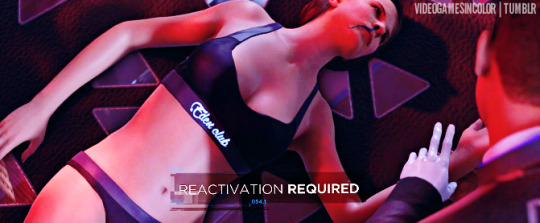
Yeah, I got nothing...
David Cage and his long romantic affair with anti-Blackness and sexism is one that is otherwise well documented, but largely ignored by the gaming community who still think addressing racism perpetuates racism and saying “SJW” indentures them with any remote credibility. To say nothing of the white liberals who’ve showered the game with praise because they’re convinced this is a profound take on the oppression narrative..
It’s unquestionable that David Cage is fixated on inserting violence done marginalized groups in his stories. He is incapable of handling the issue with maturity. And the news that his company reflects those same toxic ideas has spread long and loud enough that trying to pretend either is not a problem in this day and age in the name of “not ruining fandom’s fun” is stiflingly ignorant.
Sex workers/sex bots (all androids now) are brutally murdered and raped for not much else beyond the furthered narrative of characters like Markus and Connor. North only admits to being sexually assaulted so Cage can set up her as a lover for Markus, regardless of the player’s potential disinterest in romancing or interacting with the character. North doesn’t exist for much else besides being a prop for Markus and Cage exemplifying M/F relationships are compulsory in his universe.
Lesbians are used merely as a barometer for Connor’s morality, and are so ham-fistedly stuffed into the game (with awkward zoom-ins on their clasped hands, not once, but twice), that you can hear Cage patting himself on the back for even daring to think about two women in love on such a shallow level. They have no character or personality beyond that.
Child abuse and the abuse featured in the game feels jammed into a narrative that also wants you to sympathize with Alice’s father (Todd) because he immediately apologizes for being shitty. It’s also another excuse for David Cage to write a male character calling a female character a “bitch”, which is a reoccurring theme in all his games. Kara is constantly threatened harm by men and put situations where she barely escapes danger (or doesn’t) in ways that Markus and Connor aren’t. This is all meant to endear the audience to her relationship with Alice and her tenacity.
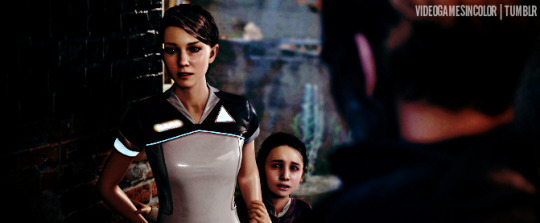
Kara and Alice ain’t even safe from the noble hobo androids
If you decide to go toe-to-toe with Todd to save Alice as Kara, Kara doesn’t get to throw Todd through a wall or even get the better of him with super android strength. She gets strangled, punched, and tossed about as though she weren’t an android but a normal human being. It’s like realizing that Jodie Holmes (Beyond Two Souls) isn’t Carrie, but is completely dependent on a ghost to protect her from sexual assault or danger in general. It’s the anti-thesis of the scene in Ex Machina where Ava (an android with a lightweight frame design) gets the advantage over Nathan. Kara and Alice barely escape with their lives.
It just comes off like cheap exploitation for the sake of making your female character suffer and it’s such a cartoon-ish portrayal of assault and child abuse. The scene wherein Kara is tied up and potentially stripped of her memory is mirrors the scene wherein the reporter in Heavy Rain is tied up and attacked by a serial killer who wants who to saw her in half and assault her.
Things get progressively worse when you start to consider how Black characters outside of Jesse Williams are utilized. The majority of Black characters represented in the game are supporting or minor characters. They run the gambit of David Cage’s greatest hits: “Scary Black Man”, the “Black Gentle Giant”, and the “Black Sidekick” who aids and furthers the narrative of his white or acceptably Black friends. Become Human also expands to respectability politics, colorism, and violence taken to new heights.

Stop_racism.png? I don’t think that’s in my programming, Carl...
Like I mentioned before, Jesse William’s Markus drives the entire narrative of Become Human. Outside of the inciting incident (the rogue android threatening to kill the child that looks a lot like Alice), nothing officially progresses until Markus becomes sentient. He is the hero of the story. As the only android taking proactive steps to rebel against the farcical android racism and slavery, the narrative dictates which decisions Markus makes are inherently “positive” and “negative”. It’s within Markus’ narrative that David Cage demonstrates that he’s just like every other white person when they observe Black communities dealing with police brutality and dehumanization.
While Become Human uses Minka Kelly’s North to badger Markus to rebel against humans with violence, even when you reject her ideas, the narrative doesn’t approach her point of view with anything other condemnation. Retaliation is never treated like it’s just as valid as pacifism (to say nothing of how they actually portray that retaliation as just mindless violence, which misunderstands the context how a city ends up catching fire).
If you agree with her and decide to avenge fallen androids, and protect the ones that are alive from immediate danger using retaliation tactics (or violence), the narrative condemns you for doing so. Markus’ punishment for not “turning the cheek” is typically death at the hands of Connor, a white character whose narrative seems to have more end-state possibilities than probably even Kara. Become Human prioritizes “peaceful protests”, but in a manner that feels lined with disingenuous intent. Quite literally not acting against your aggressors in any way is the right (and only) way to do things.

We’ve reached maximum levels of representation in media, fam
To compound the utter rot of the allegory, Jesse Williams’ Markus removes his skin (in his words “one planet, two races” lmao) and regardless of the tone you choose (”peaceful” or “determined” for example), the player is prompted with a number dialog options that include “end slavery”, “equal rights”, and a whole bunch of other things are an explicit tie in to Black History. And, unfortunately for Markus, these kinds of prompts, which includes protesting Androids singing to win the favor of humanity, continue to pop up in his dialog tree like pesky blackheads.
The constant reminders that “violence is not the answer” invokes non-Black voices saying “if you weren’t violent, you wouldn’t have been attacked by the police”. The narrative’s attitude is verbatim the kind of inanity I see posited online by spectators with no grasp on situations where Black Americans experienced violence. It even comes up in discussions about Black rebellions during the enslavement era. That’s Become Human’s narrative in a nutshell.
Jesse Williams’ position as the figurehead character in the narrative juxtaposed darker skinned characters, which all play support roles, is a continuation of the media’s reinforcement of the kind of Black character or person that is acceptable for mainstream media. He’s Black enough that he can represent Cage’s borked narrative, but “ambiguously brown” enough that he won’t raise heckles.
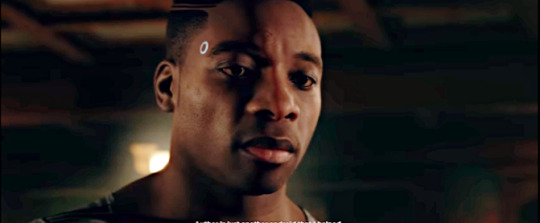
Weird how this game don’t let you romance folk you WANT to be around...
Most of the Black characters in the game are androids, most of them have dark skin, and most them amount to background dressing. They’re about on the same level as Kadeem Hardison’s character in Beyond: Two Souls. They act and sound like everyday people, but they’re still representatives of Cage’s awful narrative. For instance, there’s a linebacker of a Black android named Luther and he is the embodiment of the kind of Black man David Cage is clearly terrified of.
Originally, he was an introduction to Cage’s game during E3 2016-2017 even as some Negro spiritual singer. In the game, he’s nothing much other than a supporting character in Kara’s narrative that can die or be blocked from the continuation of the narrative pretty easily (unlike Hank, who is rather glued to your behind up until a certain point).
Instead of being some cartoonish violent thug (see: Heavy Rain), his whole directive in the narrative is to protect Kara and Alice, and not much else. He has no arc of his own and is practically itching to die for them. Characters shrink away from him in fear whenever they see him because of his size, and the entire level wherein Alice and Kara are threatened by the mad creator, uses Luther like a sentinel with the intent to harm the white characters.
Cage’s visual use of the “[Gentle] Black Giant” as a means of highlighting Kara and Alice’s literal white fragility is as bad embodies literally everything I hate about how white people regard and treat Black masculinity in their media.

I appreciate these character models. Rescue them from Cage’s asset files
There are three Black women in the game with speaking lines. Two androids, one human woman. All of them are helpers for white characters or Markus, regardless of their moral alignment. The overarching villain of the game is unquestionably is Black android named Amanda (at least I think she’s an android). She’s a facsimile of the teacher who taught Kamski, creator of the androids, what he knows. She more or less plays the “guide” to Connor (in the sense that her advice is identified in the wrong) and pretends that she wants to see an end to the rebelling androids before CyberLife loses any more credibility with the public (who are scratching their heads over machines declaring “I am alive”).
The human is a Harriet Tubman analog (Rose), who embodies the downtrodden Black mother raising the difficult Black son (Adam) whose father is absent (he died). Adam doesn’t want any part of saving androids, Rose seems to think she’s beholden to help them. From a visual stand point, Rose is probably the best looking fat character model I’ve ever seen in a game. Within the narrative, she exists for little else than to fortify the “Android Slavery = Black American Enslavement” allegory hill that Cage wants to die on. She tries to help Kara, Alice, and Luther to get across the border to Canada not once, but twice.
The last is a damaged android named Lucy. She exists solely so she can tell Markus “your choices have consequences” in a scene makes her look physic when she holds his hand. It was just like the ostentatious declaration from the menu-screen girl (Chloe), “Remember, this isn’t just a story. This is our future”. And even you know androids share information through physical contact, it’s clear that Cage modeled her as the wise mystical Black woman because reasons. And the role repeats itself when she confronts Connor about being “lost” and then dies in Markus arms saying “save our people Markus”.
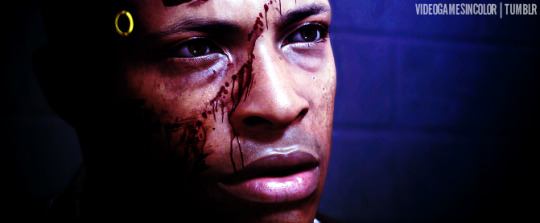
This scene was hard to watch, honestly...
Whenever Cage wants to demonstrate the “inhumane treatment” of androids, by in large Black androids are the biggest examples. Luther has his memory wiped by the mad creator who Frankenstiens androids together and is effectively a mindless slave until he sees Alice. One android (pictured above) is tortured (cigarette burns put out on his arm and the like) to the point of a going rogue and ends up murdering his owner.
To add insult to injury, the player (as Connor) is given no choice but to increase the Black android’s stress level to get him to confess (like how policemen pressure Black prisoners into acting against their self-preservation). This later drives the android to shoot himself (and maybe Connor if you tell him to stop trying to commit suicide) in the head. When Connor attempts to grill three identical Black androids for information about Markus’ whereabouts, he goes full cop on them and tortures them. He ends up getting his guts ripped out immediately afterward (but if you succeed in fixing him, he gets to shoot the android dead with extreme prejudice.)
Lucy, the android that helps Markus, was tortured and disfigured: Her head torn open, wires hanging out, and false skin unstable. Markus himself is actively punished by the narrative for being anything other than “peaceful” and “non-violent”, to say nothing of the physical violence that’s visited upon him from the jump (being kicked around and being shot, then torn apart).
David Cage’s exhibitionism with his Black characters works well enough that it gets a rise out of you, but it’s the same old exploitation of Black pain for entertainment purposes. It more or less demonstrates why white authors writing allegorical tales of fantasic racism, usually end up perpetuating it. Markus is David Cage’s cipher for tackling a story about racism, acting out racism, all without actually dealing with racism in a legitimate manner. (I’m of the opinion that, if you’re white, you don’t have the ability to anyway.)
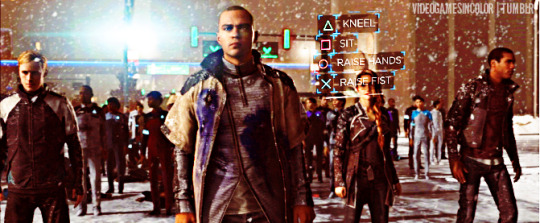
I can’t imagine what this game would’ve been like without the mess, lmao
Markus bears the burden of pretty much everything that’s wrong with this damn game with regard to how it uses allegory to build its fantasy oppression. As the catalyst, he’s not only the respectable Black character (fair-skinned, “non-violent”, “well spoken”), he’s also represents the whole of the slavery allegory through his relationship with Carl. Carl’s character so obviously represents “the good slave master” (masquerading as the “father figure”) that not only educates Markus on self-realization, but demonstrates to Markus that “not all humans” (read: white people) “are bad”.
I’d argue that if you exercised the racism allegory and Markus from the game, you might actually have, not a good game, but a game about two white androids on two ends of Cage’s undercooked attempt to wax poetic about sentient robots. But, the other Black characters like Luther, Josh, and Lucy exist, and also shoulder the burden of the writer’s ignorance, so there would be no point.
Bad Allegory is Bad Allegory;
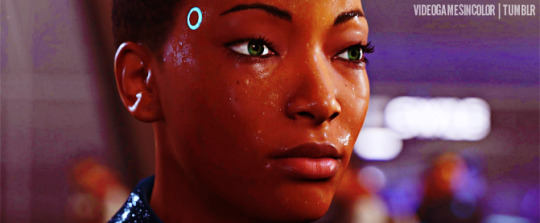
It’s a pretty looking game, with some nice moments. Not much else...
Anti-Black racism is not something (most) non-Black audiences can reasonably identify as negative for the community it happens to. When it occurs, spectators view it through the media as something that was brought on by the victim – and otherwise rightfully earned. Speaking of your experiences with anti-Blackness makes them feel doubly comfortable to say “well, I’ve never seen that happen” and insinuate that you’re lying about your traumas or microaggressions experienced.
Through the lens of speculative fiction (chiefly science fiction), the utilization of anti-Blackness as a foundation for any imaginary oppression conjured by the author, once completely removed from the Black experience, becomes a digestible and even sympathetic narrative. A commodification if you will.
There’s no talk of “both sides are wrong” and “well, they brought it on themselves”. Fictionalized marginalization often creates a white creator’s ideal victim, one their hearts can bleed for and live vicariously through, because the victims aren’t just Black, they’re also white.
Allegorical racism often ends up creating equations that consciously or unconsciously say that Black people are violent or dangerous in some way, and the fear of Black people is justified. It perpetuates the myth of the Black superhuman. The biggest example of this? Stan Lee and Jack Kirby’s X-Men unthinkingly equates discrimination of superhumans with incredibly deadly powers to the discrimination of Black people. That narrative allows a certain justification to hating mutants because some have abilities that can outright kill people who enter their breathing space, something Black folks, who are discriminated against without quarter or reason, can’t do.
Quantic Dream’s Detroit: Become Human shares all the same problems of every other speculative fiction narrative that uses allegorical racism as a backdrop. While something like Netflix‘s Bright lambasted by common sense, the gaming landscape has yet to develop strong enough set of tools that prevents games like this and Bioshock Infinite from being hailed as “daring masterpieces” for failing to properly handle the subject of race-by-another-name.
To further illustrate the brokenness of his tone deaf narrative, David Cage wants to be able to say “his game isn’t about racism” (or sexism) at the same time he admits to saying the current racial tensions in America definitely influenced him during the development of Become Human. You can’t have it both ways, nigga, pick a lane.
Detroit: Become Human is the neighbor of Bioshock Infinite. But where the latter is naked about its prejudices, Become Human takes the Crash approach (and we know how most people reacted to Crash before the honeymoon period ended). Racism is rarely handled in video games. So, the bar is so low, that merely daring to use the imagery of violence toward Black bodies, but not in any way that doesn’t make a caricature of the history, stirs something in the unaffected. I expect, like Infinite, half of a decade will need to pass before the feedback-loop from dualshock ends and think critical essays start popping up (I won’t hold my breath tho). There are people calling a duck a duck, but they’re largely ignored.
I could literally recommend anything else that handles the issue of sentient machines better than Become Human without the hamfisted racism allegory. The Terminator 2, Ghost in the Shell, The Big O, Outlaw Star, Alex Garland’s Ex-Machina, or even Alex Proyas’ loose adaptation of Isaac Asimov’s I, Robot.
If you wanted to see how androids and the advancement of technology play into the role of capitalism damaging the quality of life, Dontnod Entertainment’s Remember Me handles the subject better than Quantic Dream does by miles. Frictional Game’s survival-horror game Soma deals with the cloning of a human mind and how that mind handles being “just a copy” inserted into a machine or a machine like body.
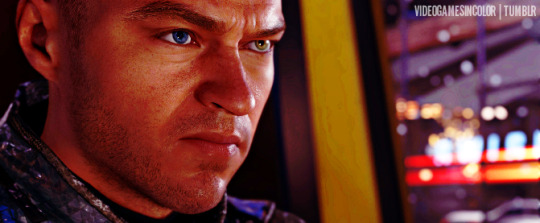
Jesse Williams living the dream as Markus Luther King Android Jr.
Become Human’s story of “oppressed androids” doesn’t work from the offset. There’s little demonstration of androids demanding their freedom and equal rights up until Markus decides, “um, yeah, we should do that, guys” and androids go homicidal on their owners around the same time. Everything is second hand accounts. There are no human antagonists that inform this fantasy racism that aren’t the equivalent of cartoonish high school bullies shoving people in lockers, or just poor representation of the counterargument from the get go. Android rebellion is practically framed like everyday appliances on the glitch to the disbelief of their owners, who end up traumatized or murdered.
Cage compounds that issue even further by writing that a virus (stemming from a copy error) gives them sentience, but that simply makes them look like machines that are malfunctioning because they need a better anti-virus program. I keep seeing people use this comparison, but an android passing on a virus that “wakes” them up, is not remotely comparable to a Black mind being stuck in the Sunken Place until someone (or they) pulls them out as depicted in Jordan Peele’s Get Out.
When talking to actual people, it’s obvious that they don't like being discriminated against. That’s not remotely the same case with Androids infected with a dormant malicious error and deciding they’re not free. It implies the enslaved were fine with slavery until they just wake up one day thought otherwise.
Also, you don’t get to frame your characters as victims when they’re literally spouting rhetoric like, “Androids are superior to humans in every way, yet we’re slaves?”
I wanted to like Detroit: Become Human like I wanted to like Beyond: Two Souls. There’s a lot to like about the concept (minus the allegory) that the game is built on, if not purely for how the primary cast interacts with their own group (sometimes).
But, for lack of a better word, the game is insensitive with its comfortable comparison of non-human characters to people of color (chiefly Black people) and marginalized identities, who still suffer from everything the game fails to tackle respectfully. Half of science fiction is built on the bones of wrong-headed allegory and misrepresentation of social issues, so its celebration isn’t surprising, just frustrating.
Detroit: Become Human is a constant reminder that David Cage thrives off the pain of the marginalized and can’t be arsed to do any introspection about that. It feels like I just got thrust back into 2013 all over again.
Allegorical racism needs to die.
776 notes
·
View notes